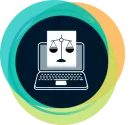

On 1 January 2021 the European Commission launched a study on ‘Drafting legislation in the era of AI and digitisation’.
The contract was awarded to the University of Bologna. Prof. M. PALMIRANI led the team that carried out the study. During 2021 the Commission and the University of Bologna intensively worked together on this most exciting topic. Results surpassed expectations. I.e., the study convincingly demonstrated the potential of the use of innovative/advanced IT (including AI) to substantially improve the core business of the Commission, i.e., developing legislation and policy.
The vision that emerged centres around a paradigm shift enabled by ‘machine processable law’ and a ‘hybrid AI approach with human oversight’ which refers to the combination of advances in IT (Artificial Intelligence, Machine Learning, Natural Language Processing, etc.), the use of standards and progress in understanding the theory and practice of law making. A well-integrated IT ecosystem with an ‘Augmented LEOS’ at its core has the potential to digitally transform legislative processes and facilitate a structural change with a significant positive impact on quality, efficiency, and transparency. The study’s findings provide a solid basis for kick-starting possible follow-up initiatives. Sounds good? And, are you willing to contribute?
The study examined in detail the use of AI in drafting legislation. Some 30 concrete ’do-able’ smart functionalities were identified. These are grouped into three broad categories: (i) legal drafting support, (ii) AI for legal consistency and better regulation, and (iii) legal systems analytics. The study illustrates the feasibility of implementing these functionalities in LEOS. Do you want to learn more?
Moreover, the study piloted four use cases on (i) learning from corrigenda, (ii) verifying the transposition of EU law by a Member State, (iii) derogations and transitory provisions, and (iv) assessing digital readiness. The work done on the pilots covers defining a methodology, preparing a dataset (extensive use is made of EUR-LEX), selecting and applying available IT tools (with a specific emphasis on visualisation), and the preliminarily analysis results. Truly amazing results obtained!
Finally, the study identifies roadblocks (along with concrete mitigating actions) and preconditions to be fulfilled to proceed @scale. A lot of work ahead!
Interested? You can access the study below and watch out future blogs on each of the use cases and Smart LEOS.
We need your expertise and let your imagination flow.